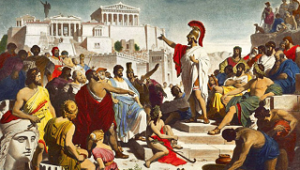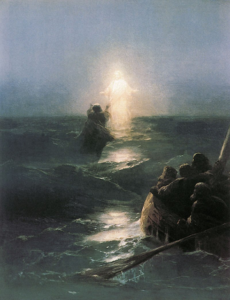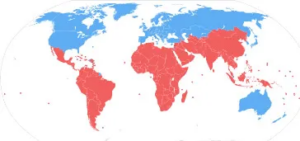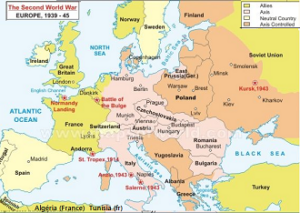
Arquivo para a ‘’ Categoria
The human and divine ascension
There are many exercises and forms that promise asceticism, ways of maintaining physical and mental energies are useful and important, but the spiritual ascent, which is the source of true asceticism, requires moral, ethical, personal and collective training that puts us in a virtuous circle.
of maintaining physical and mental energies are useful and important, but the spiritual ascent, which is the source of true asceticism, requires moral, ethical, personal and collective training that puts us in a virtuous circle.
When criticizing modern society, as a society of fatigue, Byung Chul Han reminds us that active life must be complemented with a contemplative life, which does not mean looking at infinity or the sky, it is meditation and the collective exercise of including the Another is knowing how to listen from an inner emptiness, or, as philosophy thinks, a phenomenological epoché.
He introduces contemplation as: “If sleep is the high point of physical rest, deep boredom is the high point of spiritual rest. Pure restlessness generates nothing new” (Han, 2015) and then defines it as: “Modern Cartesian doubt dissolves astonishment. The contemplative capacity is not necessarily linked to being imperishable. Precisely the oscillating, the inapparent or the elusive are only open to a deep, contemplative attention” (idem), therefore it is not a tactical exercise but a “astonishment”.
We say that it is phenomenological because of what follows the definition: “In the contemplative state, in a way, we go out of ourselves, diving into things”, this reminds Husserl “returns to the things themselves” without pre-definitions or pre-concepts, a true epoché .
After the astonishment, rest: “Without this contemplative recollection, the gaze wanders restlessly from here to there and brings nothing to manifest. But art is an “expressive action” (Ibid.), and without it our civilization, he says, quoting Nietzsche: “For lack of rest, our civilization is heading towards a new barbarism. At no other time were the active, that is, the restless, worth so much.”
This restlessness proves the wars, the most atrocious political disputes, mockery instead of dialogue and the careful analysis of social proposals and needs, there is no “rest” for this to be done.
The divine ascension, after the Christian asceticism that comes to passion and death, our civilization seems to go through this as a whole, angels appear who ask the disciples who are looking to heaven (Acts 1, 10-11): “… heaven as Jesus ascended. Then two men dressed in white appeared, who said to them, “Men of Galilee, why do you stand here looking up at the sky? This Jesus who was taken to heaven for you will come in the same way as you saw him leave for heaven”, they stopped a moment before “amazement” and “rest”.
The barbarism of the pandemic, the war and a food shortage that is announced demands “astonishment”, accept that the mystery exists and that the universe had an origin.
HAN, B.-C. (2015) A Sociedade do Cansaço. Brazil, Petrópolis: Vozes. (pdf)
Being and listening in hermeneutics
Anyone who has hearing can hear, but it is less and less common to listen carefully to the Other, this depends on the conception of Being that we intuitively have, which in more general terms means listening with the soul and the heart to what is being said.
common to listen carefully to the Other, this depends on the conception of Being that we intuitively have, which in more general terms means listening with the soul and the heart to what is being said.
The whole perspective of hermeneutical philosophy goes in this direction and it is not by chance that it has as a reference the work Being and Time by Heidegger, which among other things identifies language as the “house of being”, so to listen is to listen carefully to the Other, or in this case of hermeneutics: the text.
This development when it comes to text interpretation (but it can also be used more broadly for oral communication) is expressed as a hermeneutic circle and was more fully explained by Gadamer in his work “Truth and Method”.
Among the steps of hermeneutic “dialogue” is the recognition of preconceptions, not in the negative sense that is used in everyday life, but in the sense that we have a set of pre-established concepts when we start a reading or a conversation, the reading it is a listening of the author by the reader.
The immediacy and vicious circles of new media impede this circulation and accelerate the process that is called “swarm” by Byung-Chull Han or by “herd effect” in several authors who do not speak specifically of new media, but of dangers arising from processes such as war and denialism in the face of a Pandemic or dangers of various contaminations.
In the biblical perspective this means “my people listen to my voice and follow me” (Jn 10:27), in the current sense it is exactly the reading and interpretation of a text, and the hermeneutic methodology applies to this, it was even used in its beginning by Scheiermacher, even before Husserl.
In the biblical case, it is necessary to pay attention to the final part of the text (Jn, 10, 29) where we read that the Father (God) is the one who will snatch them and “no one will snatch them from the Father’s hand”, in this sense listen to it is also listening to the Holy Spirit through which we better understand decisions and paths adopted.
There will be humanism after barbarism
Wars, plague (pandemic) and famine (crisis in the economy and supply) all seem to indicate imminent chaos, and in fatigue people want to return to routine (the old normal) and resume life.
all seem to indicate imminent chaos, and in fatigue people want to return to routine (the old normal) and resume life.
It is, however, necessary to be careful, review the way of living, in fact the true “Society of Burnout” that we lived before the Pandemic, treat the problems that emerge and not give in to hate.
It is hatred, wars and little concern for life that feeds those who have lost a true humanist perspective, authoritarian power, force and disrespect. Life is not human, nor does it really mean “normality”.
Athens survived the war narrated in Homer’s Iliad and Odyssey, probably part of it is mythical, and this was an important language of the time, but the power of the Persians did not prevail, the small Athens united with the warriors of Sparta won and it was they who gave rise to Western civilization (picture), not by chance called the Hellenistic period, already Paris, Trojan prince desired Helen, daughter of Zeus and queen of Sparta, and this would be the reason for the war.
We survived the Black Death and the Spanish Flu, it’s true not without a lot of death and in the midst of wars, but humanity found its way, in fact it was the humanism of the Renaissance that gave rise to modernity, today in crisis along with Western civilization.
There is the nuclear danger and without a doubt it threatens the entire planet, it is not just Ukraine but an entire civilization in check, and the only alternatives seem to be total war, but we will survive.
More than the resolutions taken in the midst of conflicts that gave rise to two wars, it is now necessary to present a new civilization, a new humanism capable of uniting the human family and surpassing anthropocentrism and respecting diversity, as Morin says in search of the “ Lost Paradigm: human nature”.
Mahatma Ghandi, the Hindu leader who peacefully led freedom in India from the British Empire, said of the 7 sins that cause social injustice: “The seven sins are: wealth without work; unscrupulous pleasures; knowledge without wisdom; commerce without morals; politics without idealism; religion without sacrifice and science without humanism”.
Humanity has always found paths in the midst of eminent barbarism, it will now find it too, not all have given in to hatred, indifference and unscrupulous power.
From just human to supernatural
All forces that focus on polarization see only the human aspect of  a conflict, such as the current one in Ukraine that could at any moment become global, already with some visible signs with the visit of the US vice president to Poland and the Russian reactions. to sanctions.
a conflict, such as the current one in Ukraine that could at any moment become global, already with some visible signs with the visit of the US vice president to Poland and the Russian reactions. to sanctions.
In the hope of peace and a solution to such a dangerous conflict, fortunately some technicians from Ukraine will be able to adjust the problems at the Chernobyl Plant, but there are countless others in Europe, including the one already occupied by the Russians, the one in Zaporizhzhia, one of the biggest in Europe.
There is a supernatural side, like the values we outlined in the previous post, but there is a deeper one, they are not just prophecies like those of Medjugorje (not yet approved by the Catholic Church) that speak of an apparition of Mary as “queen of peace” It has been 40 years since the first apparition seen by 7 visionaries, there is a lot of contestation and no evident proof of this, only people who believe and who have witnessed extraordinary facts.
The important thing is to believe in forces beyond the human ones that can be mobilized, including the struggle for peace and respect for peoples and nations, all those who defend this position are in some way cooperating with the supernatural aspect of defending peace and human coexistence.
In this case it is extreme, because civilization itself can be at stake in the event of a nuclear war, the limits begin to be exceeded, on the one hand, bombs even in maternity hospitals, and on the other, a Russophobia that wants to abolish even classics of literature such as Dostoevsky, who had a free course canceled in Italy, we cannot confuse radical criticism of dictatorial attitudes with practices that are also authoritarian.
For Christians, the moment of revelation of the supernatural aspect of Jesus is on Mount Tabor, where he chooses three to present his supernatural reality to the apostles: Peter, John and James, the choice in itself is interesting: Peter the apostle called to found His church, John the apostle that Jesus loved and James called a lesser apostle, but he was a great apostle.
A well-known biblical episode Jesus “Walking on water” was portrayed in the painting by Ivan Konstantinovich Aivazovskii (1817-1900) born in Crimea, precisely a region of conflict.
The reading says that when they arrived at Mount Tabor, while he was praying (Lk 9,29-30): “his face changed and his clothes became very white and shiny. Behold, two men were talking with Jesus: they were Moses and Elijah”, of course to those who believe, there Jesus reveals himself as God.
No matter the belief, what matters more is the idea of a humanity capable of living in peace and enabling the civilizing process that moves us away from injustices, scourges and hatred.
Power and service to peoples and nations
Wars bring out the worst in humanity, but they also bring the best: solidarity, the greater desire to live in peace and respecting individual, collective and cultural rights of all peoples.
best: solidarity, the greater desire to live in peace and respecting individual, collective and cultural rights of all peoples.
When the logic of power is dominated by a non-humanist vision, it seeks personal or group interests, the idea is just to submit the other by force and conquer more power, there is no predominance of the idea of leading and serving the people who need it most. of aid, your nation and all humanity by extension and respect.
The logic is one of force, and the logic of force taken to the extreme leads to war, to personal conflict, of peoples, nations, cultures and personal interests only without a reasonable collective rule.
There are also true leaders and people who really want to serve, not only because of their generous spirit, but because of the courage, the determination that can only come from human and social values, there are even those who think about the preservation of cultural heritage, animals, in short, everything. .
The principle of self-determination of peoples, in which each nation, cultural or religious group has the right to exist and the freedom to exercise its values, of course does not include non-values of extermination or intolerance towards the principles of other cultural groups, because these serve only the power and the autocrats who lead them.
There are people who think of peace and solidarity even in war (photo Russian soldier who did not fight receives food and sends an emotional message to relatives).
We have warned in several posts of the ongoing civilizational crisis, with the war some aspects become clear, but without the enlightenment of the individual conscience it is difficult to understand the ways in which the logic of war, intolerance and discrimination advances, each one must reflect about this.
There is no lack of people and groups that adhere to this type of thinking and reasoning, when power becomes exacerbated it becomes clearer, but there are micropower structures where these values are manifested.
Thus, there are structures of hatred, intolerance, and, ultimately, war, which puts life, values in check and can even put civilization itself in danger, like nuclear weapons.
No deal and Kiev besieged
The war remains horrendous and with no prospect of a ceasefire, the third round of talks yesterday did not even result in a ceasefire for the humanitarian corridor that would allow civilians to leave, especially from regions where the fighting is bloodier. .
the third round of talks yesterday did not even result in a ceasefire for the humanitarian corridor that would allow civilians to leave, especially from regions where the fighting is bloodier. .
Russia has declared a series of hostile actions by the adopted sanctions that strangle its economy, among them: USA, Canada and the 27 countries of the European Union, in alphabetical order the other countries: Australia, Albania, Andorra, United Kingdom, Iceland, Japan, Liechtenstein, North Macedonia, Micronesia, Monaco, Montenegro, New Zealand, Norway, South Korea, San Marino, Singapore, Switzerland, Taiwan and Ukraine.
Brazil was left out, perhaps because of the president’s speech explaining the reasons for “neutrality” on Sunday, it managed to unite right, center and left: at least a diplomatic discomfort since a large part of the world has already condemned and imposed sanctions on Russia, including China and it would have more reasons than Brazil to join: ideological.
With no prospect of peace now, attention and tensions turn to Kiev, close to the city there are small towns and forests such as the Zalíssia National Park that presented some forms of resistance, however they were rejected with denouncements of violations and war crimes, there was no negotiation that would allow the evacuation of civilians, so many civilians are in the city.
In the evenings, the curfew comes and people go to improvised air-raid shelters, train tunnels, hotel basements, buildings and even churches (the crypts), which are the usual refuges.
Whatever the outcome of this struggle, the Ukrainian people and their president have won respect and admiration around the world, while Putin and Russia will come out as villains, even though there have been peace protests, Putin’s position is strong within Russia and there is a strict control of media and narrative.
Kiev lives on hope and a motivation to defend its people (in the photo a cloud that looks like an angel photographed by resident Oksana Kadiivska, from Kiev’s Darnitsa district).
To those who have some form of belief, there is hope for a better time, also in mentalities, since warmongering, intolerance and little empathy walk the streets.
Love enemies and avoid wars
Last week we talked about how famine, pestilence and wars were closely correlated, in yesterday’s post we showed how the “division” of Europe was in the post-war period, the first North African countries that were under France (Libya and Tunisia) and Spain (Morocco), and we discussed the wars that still take place there due to phosphate mining.
closely correlated, in yesterday’s post we showed how the “division” of Europe was in the post-war period, the first North African countries that were under France (Libya and Tunisia) and Spain (Morocco), and we discussed the wars that still take place there due to phosphate mining.
Virtually all of Africa was colonial, except for Liberia and Ethiopia, the latter, which is still the headline of famines and wars, is now joined by Somalia, which was an Italian colony, in the post-war period Russian influence in the liberation struggles increased. influence in several regions, such as Angola, Mozambique and Guinea Bissau, but practically all of Africa enters this boiling process, and the allied forces that had formed the United Nations, Japan defeated in the war had to recognize the independence of Korea (until then unified) and the concession of the Kuril Islands to the Soviet Union, but which have recently fueled tension between Russia and Japan.
So the United Nations was not able to promote independence without big and bloody wars in Africa, some still persist, decolonization is just a new way of dependence, just as in America dependence on ideological struggles, these cultural and internal, never allowed real peace and an end to the cold war.
The fall of the Berlin Wall and the dissolution of the Soviet Union, with several countries becoming independent and returning to their original culture, it is a mere illusion to think that they are buried by ideologies, it seemed to give rise to a world where political, cultural and religious diversity would be tolerated, although the Arab tension never happened, the Arab Spring was an encouragement, but the forces that are still alive within these nations are still operating vigorously, see tensions in Libya, Congo, Sahara and many others, too Latin America is experiencing a polarization sometimes to one side and sometimes to the other.
The economic and political strength that China has gained, the new geopolitical influences of Russia, the tension between the north and the poor south, the crises of the democracies all seem to accelerate a process of establishing a New World Order, some more fatalistic currents call it for the acronym NOM, but in fact all this is just the boiling of issues that the post-war period has not resolved, the United Nations is still not what it promised to be a real “concert of nations” that live in peace and negotiate conflicts.
So we live a bipolar tension in many ways, north-south (photo), colonies and colonizers, ideological tensions that act today more internally than externally, and a pandemic that accelerated this whole process, if the world could be polarized it could be unipolar, there is a positive perspective that would be the real “concert of nations” and a bad one that is the polarization in one of the perverse factors that have already acted on humanity.
How to live with such huge cultural and political differences, a principle of friendship or peace that is always threatened is not enough, it is necessary to accept and defend diversity, to overcome the concept of “enemy” in the form of hate and intolerance (we wrote several posts to explain this), what in terms of Christian culture is called “loving your enemy”, says the reading Lk 6:27-28: “I say to you who hear me: Love your enemies and do good to those who hate you, bless those who curse you, and pray for those who slander you”, in other words neither unipolar nor bipolar, but a multipolar world.
Hate and Intolerance in History
It is necessary to know the historical process to understand the bases on which a world polarization and an alleged new world order, a very vague term and subject to many interpretations, which led to polarization in the period of the Cold War and which seems to return with new molds, where the leaven of hate can flourish.
the bases on which a world polarization and an alleged new world order, a very vague term and subject to many interpretations, which led to polarization in the period of the Cold War and which seems to return with new molds, where the leaven of hate can flourish.
The reasons that led to the formation of the Axis, an alliance with the Nazis in World War II, were: territorial expansion with the creation of empires based on military conquests and the overthrow of the post-First World War international order, and the destruction and neutralization of Soviet communism.
Germany and Italy signed 1st. November 1936, a week after announcing a friendship pact, the creation of the Rome-Berlin Axis and then on November 25, 1936 the Anti-International Communist Pact (Comintern) in opposition to the Soviet Union, Hungary, Bulgaria and Slovakia joined the Axis in November 1940, later Croatia joined, Finland joined the USSR in 1941 and in April of that year Yugoslavia was invaded and dismembered by Axis forces and then the Soviet Union.
At the beginning of the war, in 1st. From September 1939, the allies were France, Poland and the United Kingdom, as well as the states dependent on the British Crown: India, Australia, Canada, New Zealand and South Africa, after the invasion of Belgium, in addition to the Netherlands and Greece joined the allies, the Soviet Union supported the invasion of Poland, but realizing that it would be betrayed by the Nazis, it also became an ally, the United States would fully enter the War after the attack on Pearl Harbor (7 December 1941 ), supported with money and weapons until then, in December 1941 it became an allied member with troops and sending heavy weapons to Europe.
China has had a protracted war with Japan since the Marco Polo Bridge Incident in 1937, which was an incident of the disappearance of a soldier and troops stationed on either side of this bridge that is close to Manchuria (the disputed region), so China officially joined the Allies in 1941.
With the Axis practically defeated, the Tehran Conference was held with the first territorial divisions of the occupation troops in each country, this is important to understand the Soviet advances constituting Eastern Europe, the D-Day of the disembarkation of the troops in Europe was held in December 7, 1941.
The Potsdam and Yalta conferences were held on July 17 and August 2, 1945, respectively, before the bombing of Nagasaki and Hiroshima on August 6 and 9.
Two attitudes must be analyzed in the post-war agreements, one is the reintegration of German territory to the war in the limits before the first war, with the exception that the place where the former Königsberg was after Stalingrad and today Kaliningrad was taken by the USSR and the Germans. were expelled, the negative was the nuclear bomb on Nagasaki and Hiroshima when the war was practically over, and the effects of the bomb marked the history of mankind forever, dropped in August 1945.
In the next post, we will analyze the advance and the almost end of the cold war and what can cause an imbalance and create a New World Order, an acronym used in different ways.
Covid: beginning of a possible fall
While the moving average and the number of infections remain at high levels, there are already signs of a downward trend, 58,056 cases in the last 24 hours, however the number of deaths remains high in most states (880 deaths on average mobile), being in stability only in 4 states: Santa Catarina (SC), Amazonas (AM), Roraima (RR), Goiás (GO), did not disclose TO – Tocantis and DF – Federal Distrit Brasilia, it is necessary to emphasize that given states always refer to “known cases” because there is no policy of mass testing.
high levels, there are already signs of a downward trend, 58,056 cases in the last 24 hours, however the number of deaths remains high in most states (880 deaths on average mobile), being in stability only in 4 states: Santa Catarina (SC), Amazonas (AM), Roraima (RR), Goiás (GO), did not disclose TO – Tocantis and DF – Federal Distrit Brasilia, it is necessary to emphasize that given states always refer to “known cases” because there is no policy of mass testing.
Researcher Raphael Guimarães from Fiocruz argues that the adoption of public policies for the collective control of the pandemic, in addition to the hygiene measures that are maintained, can lead the country to control the pandemic in the first half of 2022: “At this moment, Brazil gathers some favorable conditions to block the virus”, the researcher explained to the press.
Maintaining distance, for example, and limiting the number of people in collective events are important when adopted, but what is observed is that distance is not the collective behavior of the population and inspection ceased to exist in most cases, With few exceptions, the result is hospitals that are still full, together with the vaccination of influenza, which is still small, and the vaccination of children who still have only the first dose.
While in Europe the downward trend has already been observed, in Latin America 63% of people are already vaccinated, but coverage remains uneven, data from health agencies in the region (PAHO) indicate that 14 countries have already vaccinated 70% of the population while the others failed to achieve even 40% of this coverage, reports PAHO Director Carissa F. Etienne: “These data are crucial for designing targeted vaccination campaigns, maximizing the impact of doses, and saving lives,” who thanked vaccine donor countries.
Donors who “helped our region secure doses when supplies were limited”, citing donations from the United States, Spain, Canada, Germany and France, which totaled 26 million doses, but expects to reach 100 this early this year. millions of donation doses.
Public policies must be more affirmative and not give up the necessary supervision, so we can imagine a more peaceful second half of the pandemic.
Moving forward to true thinking
No thought is complete if it does not have a spirituality, what modernity calls subjectivity but which is separate from objectivity as is typical of dualism, creates two realities and neither is part of the whole.
calls subjectivity but which is separate from objectivity as is typical of dualism, creates two realities and neither is part of the whole.
Contemplating the whole means considering the depth of our Being and understanding that we are part of an immense universe full of mysteries, and that our soul yearns for infinity and that is where a true spirituality walks, which is not separated from the substantiality of life (the which is called objectivity in modernity, which is just the part) and that without it we do not contemplate and live the whole, we live a segmented life.
To replace it with a small part, small vices and pleasures, is to walk in frivolity, in superficiality, no true asceticism does without a spirituality, and there is no spirituality without contemplating the human soul as part of the whole of our Being, thus surpassing anthropotechnics and to arrive at an onto-anthropotechnic that looks at things and also at the soul.
Many exercises, from the physical to the spiritual, are done seeking this asceticism, at this point Sloterdijk is right almost all of them are “despiritualized” but his explanation is incomplete because there is no eschatology in their spheres, this reasoning is done especially in Spheres II, which is the whole towards which we walk, it is possible to go to Him.
Yes, it is possible if we move towards deeper waters, seek the completeness of our substantiality, overcoming anthropocentrism and understanding the Earth and the Universe as our home, our abode, but mainly walking and casting the nets for deeper thoughts and spiritualities, there is at high sea, even if raging, what our soul longs for: the eternal.
The biblical passage Lk 5:4-5 says, right after Jesus taught the crowds and Peter (Simon) complained that they had not caught anything, Jesus answers him: “when he had finished speaking, he said to Simon: “Go into deeper waters, and cast your nets for fishing”, Simon replies that he worked all night and caught nothing, but obeyed and cast the nets.
The result was a great fishery. Here, the substantiality of the food and also the spirituality of advancing “to deeper waters” are worthy.

